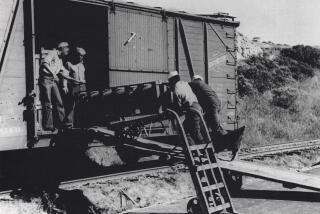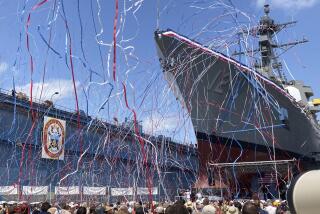Navy, Pueblo Crew Pay Bucher Last Respects
- Share via
SAN DIEGO — As a chill wind swept in Tuesday from the ocean, retired Navy Cmdr. Lloyd “Pete” Bucher, who died last week at the age of 76, was accorded a measure of the respect that his shipmates long believed the Navy had wrongly denied him.
After an emotional funeral attended by many of the men whose lives he had saved, Bucher was buried with military honors at Ft. Rosecrans National Cemetery.
The Navy that once seemed to shun him provided a 21-gun salute. Two young sailors presented Bucher’s wife, Rose, with the American flag that had covered his casket.
And the gravestone identified Bucher as a former prisoner of war, a designation that the Navy once sought to deny him out of embarrassment that Bucher had surrendered his ship, the Pueblo, without firing a shot.
Criticized by the Navy brass, Bucher was nonetheless a hero to the crew of the Pueblo, who credited his strength and bravery with helping them survive 11 months of torture in a North Korean prison camp.
“He leaves a void which will never be filled,” said a Pueblo crew member, Dale Rigby, his voice breaking.
At an earlier service at St. Michael’s Church in suburban Poway, near the home where Bucher and his wife lived for three decades, Bucher was praised as a dedicated captain, a doting father and a tireless worker for Boys Town, the Nebraska home for orphaned boys where he was raised.
Bucher was the skipper of an intelligence-gathering ship operating in international waters Jan. 23, 1968, when five heavily armed North Korean warships attacked and demanded that the Pueblo surrender.
With his ship badly outgunned, Bucher surrendered rather than risk what he felt would be certain annihilation of his 82-man crew. A desperate call, asking a nearby carrier task force for help, went unanswered.
Several crew members wore hats to the ceremony with the angry slogan, “One Little Ship, Such a Big Country, What’s the Big Deal?”
The surrender may have saved lives, but it also allowed the North Koreans to seize hundreds of pounds of intelligence documents and equipment that crew members did not have time to destroy. To this day, North Korea displays the Pueblo as a trophy.
Eleven months after being captured, the crew was released when the U.S. issued an apology for alleged spying -- an apology that was immediately repudiated when the crew members were safe.
With the humiliation at the first surrender of a U.S. ship since the War of 1812, a Naval Court of Inquiry recommended that Bucher be court-martialed. Although the recommendation was not followed, Bucher’s career was ruined and he retired quietly in 1973.
“He cared more about people than anybody I ever met,” said Pueblo crew member Brad Crowe. “He paid a terrible price: his career.” Crew member Richard Arnold said he last saw Bucher at a reunion two years ago, when his health was already slipping because of emphysema and other causes.
“I knew he wasn’t good, but his spirits were high,” Arnold said. “That’s just how he was.”
Though the ceremony -- attended by several hundred friends and former shipmates and a handful of active-duty enlisted sailors -- may have helped ease some of the anger that Pueblo sailors feel on Bucher’s behalf, there was a sense that the military could have done more to honor his memory.
“I wish they had done a fly-by,” said Sharon Russell, wife of Pueblo sailor Stu Russell. “He deserved it.”
More to Read
Sign up for Essential California
The most important California stories and recommendations in your inbox every morning.
You may occasionally receive promotional content from the Los Angeles Times.













